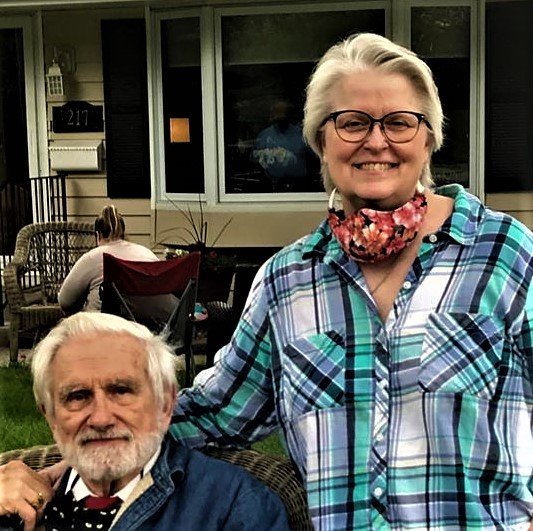

K0HTF
Tom (Doc) Gruis

This
is Tom "Doc" Gruis, K0HTF
Extra class, 87 years young. I attended high school at Des Moines Tech
and graduated in 1954 and I was first licensed in 1956 and joined ARMS in 2020.
My many Main interests in ham radio are, nets, beacons, digital voice modes, rag
chewing, experimenting, repeater and radio in general
and have calls of KØHTF, WQNU766 - KYGCH. I was a High school teacher
for 41 years, doctorate in
education, broadcast engineer, had
first class 'phone with radar endorsement, disk jockey for several. I am a
member of UMC and certified lay speaker since 1985,
Gideon since 1966 and life member and approved speaker, BA in religion
and philosophy, chaplain for several Masonic bodies,
have conducted some several funerals,
taught world religions in a public school,
etc..... and I was a
volunteer hospital chaplain for almost 20 years.
I have been married to Donna for over 43 years and counting, 38 year old
twins, all of my children have accepted Jesus. My favorite Bible verse is
Colossians 1:17 - In Him all things cohere.
The
following is my Dissertation abstract 12-27-2020
AN
INQUIRY INTO SOME RELATIONSHIPS BETWEEN
CHURCH
ATTENDANCE AND SCHOOL PARTICIPATION
BEYOND
REGULAR CLASSROOM ACTIVITY
Order No. 8009714
Gruis,
Thomas Elwood. Ed.D., Drake University, 1979
153pp.
Adviser: Robert L. Evans
The
Problem.
The purpose of this study was to determine if certain relationships exist
between students’
frequency
of attendance at church and grades, involvement in school sponsored activities,
and certain social characteristics in their school lives.
Procedure.
The study was conducted in all ninth-grade social science classes at a junior
high school in
Iowa.
This sample provided a good cross section. There were small numbers of black and
Jewish students, but a larger group of Latino students. However, the problem was
to identify relationships between school participation and church attendance: it
was a sample that gave a good indication of churched and non-churched
students.
An
inventory was designed by the researcher in consultation with Drake faculty
members to gather data. The
Instruments
were screened for usefulness on each of the questions asked. The Chi-square test
of independence was applied to the data generated on each of the questions asked
relating to school activities tabled against the frequency of church attendance.
A significance of 0.05 was assumed.
Findings.
Each of the three relationships stated above was investigated through the use of
null hypotheses. In all cases except one, a significant relationship was found
between the frequency of church attendance and the specific item of each null
hypothesis. The exception was the frequency which Students reported they felt
good about themselves. The study includes results of the Chi-square tests for
the entire group and also for the comparison of those who attend church more
than once per week to the balance of the sample, and those who never attend
church to the balance of the sample, and those who attend church more than once
per week to those who never attend church. Results are reported also for the
whole group of a test instrument administered before the inventory and to a
different group.
Conclusions.
On the basis of this study, it is concluded that church goers do get higher
grades, are more involved in school activities both in terms of frequency of
attendance and in the number of groups attended, and do have certain different
social characteristics than non-church goers which include fewer absences from
school, more frequent enjoyment of school, the number of students planning to go
on a class trip, and less frequent discipline. The frequency of feeling good
about themselves was at the 0.1 confidence level and indicated a positive
relationship. The most consistent indications of significance occur in terms
of comparison of the whole sample to those who never attend church. Any church
attendance does affect the grades, participation and social characteristics of
the students.
Recommendations.
Further studies should be conducted to determine which churches show the
greatest relationship to the school participation; what practices are seemingly
most beneficial in a total church program to school participation: if other
non-school institutions also have an effect on school participation: if there is
indeed a causal relationship between church attendance and school participation:
what input the school may have on the students’ church participation; and what
is the nature of the students’ activities at church relative to their school
participation.
Updated 11 January 2024